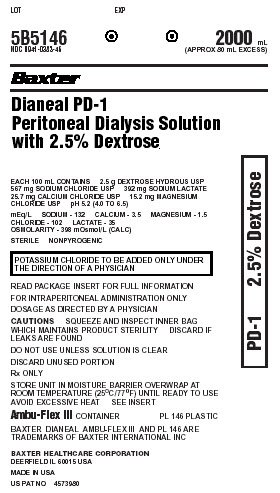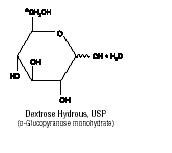Dianeal Pd-1 With Dextrose while Breastfeeding

What is Dianeal Pd-1 With Dextrose used for?
I am breastfeeding mother and I am using Dianeal Pd-1 With Dextrose. Can it have any bad effect on my kid? Shall I search for better alternative?
Dianeal Pd-1 With Dextrose Breastfeeding Analsys
Dextrose while Breastfeeding
SafeCAS Number: 50-99-7
Glucose (dextrose), as a component of oral re-hydration solutions, fluids for IV use, or, as excipient of drugs, is entirely compatible with breastfeeding. Nevertheless, D/W solutions orally used in neonates just after birth are highly discourage since it may affect initiation of lactation seriously.
Sodium chloride while Breastfeeding
SafeCAS Number: 7647-14-5
Sodium chloride either as cooking salt, or, as oral rehydration solution, or, as IV fluid, is entirely compatible with BF.
Sodium lactate while Breastfeeding
SafeCAS Number: 72-17-3
It is a constituent of IV and dialysis fluids. No problem with BF has been reported.
Calcium chloride while Breastfeeding
SafeVarious calcium salts (Acetate, Carbonate, Chloride, Citrate, Phosphate, Gluceptate, Glucobionato, Lactate, Laxctobionato Pidolate, Silicate) are used in the management of hypocalcemia, supplements for treating calcium deficiency states and antacids ( Carbonate and Silicate) Daily requirement of calcium during lactation are 1 g (1.3 g in children under 20 years).Calcium supplements in the diet does not affect the concentration of calcium in milk.Excessive intake of calcium is not good for health. During lactation, consumption of calcium should not exceed 2.5 g a day. WHO List of Essential Medicines 2002 states that it is compatible with breastfeeding.
Dianeal Pd-1 With Dextrose Breastfeeding Analsys - 2
Magnesium chloride while Breastfeeding
CAS Number: 3344-18-1

No information is available on the clinical use of magnesium citrate during breastfeeding. However, other magnesium salts have been studied. Intravenous magnesium sulfate increases milk magnesium concentrations only slightly. Oral absorption of magnesium by the infant is poor, so maternal magnesium citrate is not expected to affect the breastfed infant's serum magnesium. Magnesium citrate supplementation during pregnancy might delay the onset of lactation, but it can be taken during breastfeeding and no special precautions are required.

What should I do if already breastfed my kid after using Dianeal Pd-1 With Dextrose?
We are not completely sure about safety of Dianeal Pd-1 With Dextrose in breastfeeding. We would suggest you to contact your doctor or health care provider and explain your situation with Dianeal Pd-1 With Dextrose. If you observe anything abnormal with your baby please call 911 or contact emergency services in your area.
I am nursing mother and my doctor has suggested me to use Dianeal Pd-1 With Dextrose, is it safe?
If your doctor considers Dianeal Pd-1 With Dextrose safe enough to prescribe for you that means its benefits outweigh its known risks.
If I am using Dianeal Pd-1 With Dextrose, will my baby need extra monitoring?
Not Sure, Please check with your doctor or lactation consultant.
Who can I talk to if I have questions about usage of Dianeal Pd-1 With Dextrose in breastfeeding?
US
National Womens Health and Breastfeeding Helpline: 800-994-9662 (TDD 888-220-5446) 9 a.m. and 6 p.m. ET, Monday through Friday
UK
National Breastfeeding Helpline: 0300-100-0212 9.30am to 9.30pm, daily
Association of Breastfeeding Mothers: 0300-330-5453
La Leche League: 0345-120-2918
The Breastfeeding Network supporter line in Bengali and Sylheti: 0300-456-2421
National Childbirth Trust (NCT): 0300-330-0700
Australia
National Breastfeeding Helpline: 1800-686-268 24 hours a day, 7 days a week
Canada
Telehealth Ontario for breastfeeding: 1-866-797-0000 24 hours a day, 7 days a week
